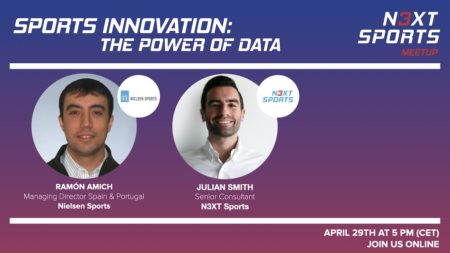
The acceleration and proliferation of technology have led to more data generation than ever before. In 2017, IBM estimated that 90% of all data was generated over the course of the previous two years. Data is generated from everything we do, from movement to commerce, and of course, sports is no exception. Fans have various data generating physical and digital interaction touchpoints like social media, merchandising, ticketing, and attendance, but are we really doing enough to connect all of these dots? When we talk about data, we mean the data surrounding operations, logistics, financial planning, CRM, and the myriad of other data coming from the business side, as well as the performance data from the sports itself.
For our weekly online Meetup, we had the pleasure of hosting Ramón Amich, Managing Director of Spain & Portugal at Nielsen Sports, who helped us understand why data is now viewed as the world’s most valuable commodity, and how it can lead to better decision making.
Data in sponsorship is more important than ever for rights holders. Sponsors now base their investment decisions on elements like what kind of audience they can attract, how far their exposure will reach, and what financial and non-financial returns can be earned; all of which can be detailed with the right data strategy and analytics in place from the rights holder.
¨To get the big sponsorship deal, you need to show the fans you have around the world, the viewers you have in your matches on TV, the followers you have in your social networks, you need to show the visibility the exposure that your brand is going to generate during the season, and that’s when data plays a big role.¨
Decisions in the past could be made on sentiment and legacy practices, but in turn, were riskier. As competition in the industry of sport grows, both from the perspective of sporting and business performance, it’s important to ensure that expenses and operations are being executed in a way that reduces risk. Data is the foundational component in supporting fact-based judgments, including around valuation, commonly known as data-driven decision making. Ramón’s conversation provided an example of how data can provide clarity to abstract and complex matters: how do we determine the value of the on-screen time of a sponsor? We must ask questions like, how visible was the sponsor, was the viewer’s eye attracted to the logo, how many brands were on screen at the same time? These answers ensure both sides of the sponsorship equation are evaluated in a transparent, equitable manner, paving the way for better pricing of TV rights, sponsorship deal, the rights to acquire certain competition, and stadium naming rights.
As important as Nielsen Sports’ core business is of gathering and analyzing data around value generated by sports sponsorship, the COVID-19 crisis has shifted the company focus to look at damage control and the potential losses that can be faced in the midst of the sports shutdown. Nielsen has also analyzed alternative means of engagement, producing deep-dive reports on social media sentiment and other content viewership overviews. During our online Meetup, Ramón shared exclusive content that is reserved for their top clients: key figures about consumption habits during COVID-19, a research document they launched later that day.
Their findings show how right holders are not offering as much content as pre-shutdown, as there are no live sporting events happening, but also that content appetite and consumption is going up.
¨Covid-19 could lead to a 60% increase in the amount of content we watch. We are seeing higher engagement on social media, so that means that people need and want to consume content, which means that right holders need to fill that need.¨ – Ramón Amich
Organizations that have invested in and developed digital platforms have fared much better in keeping close to their fans and riding out this crisis better than the average. The impact of the COVID-19 outbreak is proving to be a microcosm of the much larger need for sport to be able to adapt quickly, to leverage digital solutions, and to think innovatively about their operations.
A company like Nielsen Sports can help make decisions through data. Importantly though:
¨As a right holder, you have to know what assets you have that can be included in the sponsorship package, and also you have to know who you are in your own market¨ – Ramón Amich
Our team at N3XT Sports has a wealth of experience in this regard and can help you by reviewing and redefining the organization’s digital and data architecture in order to be able to monetize digital assets and identify new digital revenue streams.
Get in touch with our teammate Javier at javier@n3xtsports.com to find out more about some of our turnkey digital transformation projects, including a digital readiness assessment that can set you on your path.
If you were not able to make it to our online session, you can watch it here, also we would like to invite you to subscribe to our newsletter, and follow us on Linkedin, Twitter, and Facebook to stay up to date with any N3XT Sports news.



